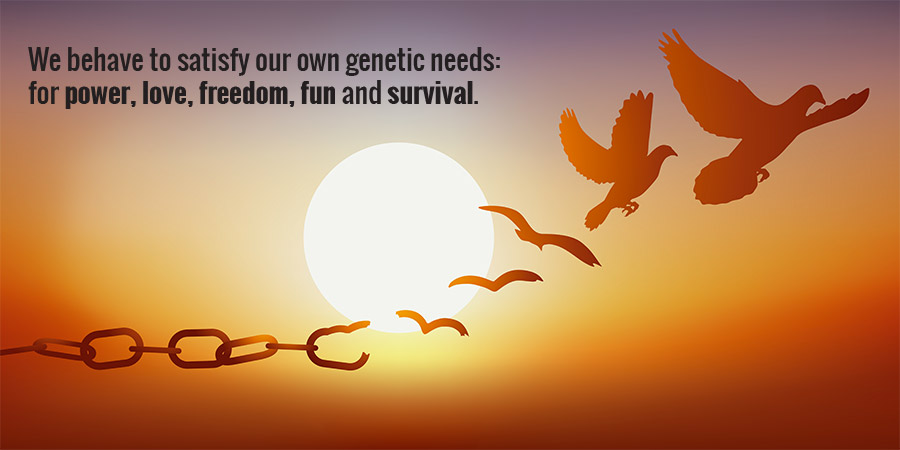How Minds Really Work - the experience of internal control
Some people struggle with the reality that we are internally controlled. They notice that they are influenced by other people and events. They are aware that they sometimes do what they don't really want to do. They feel that the behaviour of other people is 'causing' their unhappiness. Given that these experiences are real, it is very easy to adopt the myth that we are externally controlled - that our behaviours are the result of other people or events.
Now nobody would deny that there are events occurring around us that influence our behaviours. And certainly, our emotions are often linked to what other people do. But the link between external events and our responses include our own internal processing.
Inside ourselves, we have our own internal reference points. It is these internal sources of our unique behaviours that are the drivers of the responses that we choose.
Researchers and practitioners in the disciplines of psychology are increasingly coming to agreement that we have a genetic disposition to satisfy our biological and cognitive needs.
Dr William Glasser1, the pioneer of Choice Theory, explained that we act to satisfy our genetic needs. We all have a need for power, love and belonging, freedom, fun and learning. Our need for 'power' includes self-control, achievement, success, status and personal significance. Because of our need for freedom we strive to be autonomous, the author of our own actions, to be self-determining. Our need to belong includes the need to give and receive love, be accepted and connected. Learning and enjoyment are connected by the need to learn and have fun. All these needs are cognitive and they are always highly individual. Our related biological need is to survive, to be free of threat and feel comfort and security.

We behave to satisfy our own genetic needs: for power, love, freedom, fun and survival.
From the time of our birth we recognise and store in our minds 'snapshots' of the ways our needs are satisfied. When we experience something, some person or some idea that gratifies the need, we store the experience away for future reference. These experiences form our ideal or 'quality' world. They are our very personal internal reference points. We behave in order to repeat or approximate these experiences and try to control the 'real world' around us to maximise the opportunities for this to happen.
Because our quality world is only accessible from the inside, nobody outside us can be really sure what we are controlling for. When they try to manage or motivate us using the usual external control behaviours (threats of pain or promises of pleasure) they are behaving to get their own needs met.
These external signals will sometimes get our attention or compliance, that is why the external control myth survives.
But what is really happening when I respond to them is that my own internal reference point corresponds with my perception of their inducement. I am doing what I want - even though it seems that I am doing what you want!
Our biological need for survival, comfort and safety is also important. It works in a similar way to our cognitive needs, but because this need is self-protective it is more likely to also generate avoidance of perceived threat than our cognitive needs. When people are very conscious of their survival need they can easily become fearful and seem resistant. Increasing attempts to use external control on people who are already highly tuned to threat increase their fear and resistance.
Understanding that we are internally controlled, the implications for the practices of teachers, bosses and parents are profound.
When any of us, children or adults, is doing their very best to make life need satisfying – which is what all of us are doing, always – then trying to impose external control to change the behaviour of another person will decrease our influence, damage the relationship and create resistance. If we want our children or colleagues to be productive, we will always do better if we encourage them to harness their own genetic needs in a more responsible and effective way. Rather than pushing against their own internal motivation, we can learn to use it.
The Myth of external control is pervasive but misleading.
In summary, the myth that we are externally controlled may be pervasive but it is misleading. When we accept its ubiquitous assumptions, we damage relationships and create pain in our own lives and the lives of others by attempting to impose on other people what seems right to us – features of our own quality world.
When we understand that every one of us is an internal control system we can stop pushing and prodding, nagging and threatening, punishing and rewarding in order to get what we perceive as control. Instead we can help our schools, relationships and businesses to thrive by respecting that everyone is always doing the best they can to satisfy their own needs. We can only control our own behaviour. It follows that we can use our energy and time most usefully if we concentrate on putting ourselves, our ideas and our agendas into other people's quality world by connecting strongly with them and helping them to find responsible ways to get what they want.
1 Dr William Glasser: 'Choice Theory - a new psychology of personal freedom', Harper Collins, 1998.
Rob Stones is a Senior Faculty Member of the William Glasser Institiute. See more info at
Choice Theory











